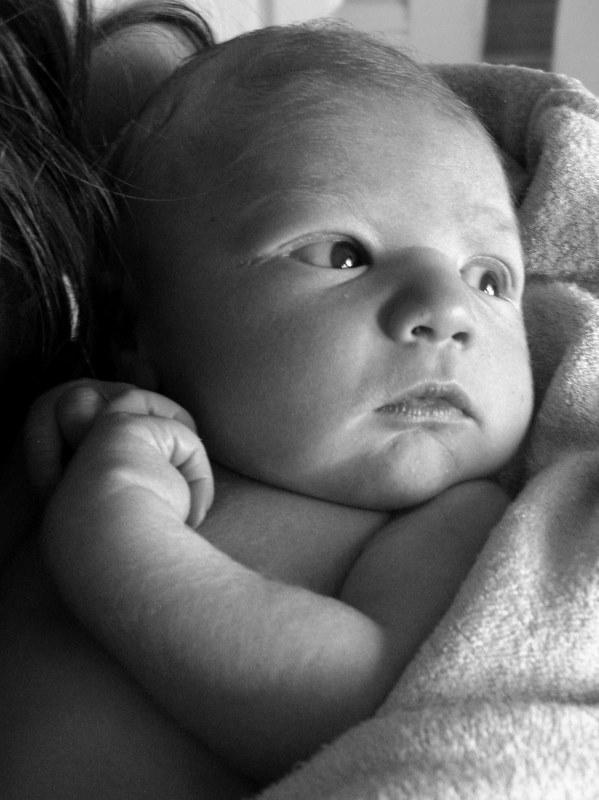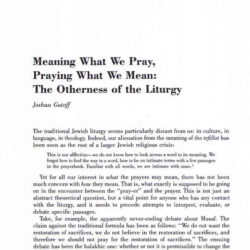Think of how a b’rakhah works. When a Christian says Grace, it’s something like, “Bless this food to our use,” or “For what we are to receive make us truly grateful.” The prayer points to what’s about to be eaten: this food; these gifts. But a traditional b’rakhah is almost blind to the food on the table “Blessed are You…Who brings bread from the earth” – even though without the bread, this statement would be considered a blessing in vain. So: A Jewish blessing takes a phenomenon and, rather than talking about it directly, uses it as an opportunity to talk about the sacred. We may eat the food, but what we see is an example of God’s eternal bread-giving nature.
So, too, with the life-cycle rituals. Think of a wedding. When we look at the chuppah, the blessings invite us to see both a reminder of Eden and a trace of the redemption-to-come. A funeral invokes the idea of God’s ineffably just providence, and recasts our grief as part of a response to the cosmic rupture symbolized by the Destruction of the Temple. And in a Brit Milah the circumcision of this particular baby is a reminder of God’s initial covenant with Abraham (“The blessed Holy One said to Abraham our father, ‘Walk before Me and be perfect”), the Exodus (“I passed over you and saw you weltering in your blood, and said, ‘In your blood may you live'” – understood by the midrash to refer to the bloods of both the first Passover offering and circumcision, and, in its invocation of Elijah, the redemption yet to be.
What I wanted was a baby-naming ceremony that did similar work; that is, that recasts the naming as a microcosm of events in sacred history. And in fact naming in Torah has both covenantal and redemptive significance. The reference to the “garments of triumph” and “robe of victory” in the Isaiah passage naturally suggested wrapping the child in a tallit as a transitional event that might otherwise be lacking.
| Hebrew | English |
|---|---|
אֲנִי הִנֵּה בְרִיתִי אִתָּךְ וְהָיִיתָ לְאַב הֲמוֹן גּוֹיִם׃ וְלֹא־יִקָּרֵא עוֹד אֶת־שִׁמְךָ אַבְרָם וְהָיָה שִׁמְךָ אַבְרָהָם כִּי אַב־הֲמוֹן גּוֹיִם נְתַתִּיךָ׃ וְהִפְרֵתִי אֹתְךָ בִּמְאֹד מְאֹד וּנְתַתִּיךָ לְגוֹיִם וּמְלָכִים מִמְּךָ יֵצֵאוּ׃ וַהֲקִמֹתִי אֶת־בְּרִיתִי בֵּינִי וּבֵינֶךָ וּבֵין זַרְעֲךָ אַחֲרֶיךָ לְדֹרֹתָם לִבְרִית עוֹלָם לִהְיוֹת לְךָ לֵאלֹהִים וּלְזַרְעֲךָ אַחֲרֶיךָ׃ (בראשית יז:ד-ז) |
“As for me, here, my covenant is with you, so that you will become the father of a throng of nations. No longer shall your name be called Avram, rather shall your name be Avraham, for I will make you Av hamon goyyim/Father of a Throng of nations! I will cause you to bear fruit exceedingly, I will make nations of you, yes, icings will go out from you! I establish my covenant between me and you and your seed after you, into their generations as a covenant for the ages, to be God to you and to your seed after you.”[1] Genesis 17:4-7. |
וַיֹּאמֶר אֱלֹהִים אֶל־אַבְרָהָם שָׂרַי אִשְׁתְּךָ לֹא־תִקְרָא אֶת־שְׁמָהּ שָׂרָי כִּי שָׂרָה שְׁמָהּ׃ וּבֵרַכְתִּי אֹתָהּ וְגַם נָתַתִּי מִמֶּנָּה לְךָ בֵּן וּבֵרַכְתִּיהָ וְהָיְתָה לְגוֹיִם מַלְכֵי עַמִּים מִמֶּנָּה יִהְיוּ׃ (בראשית יז:טו-טז) |
…God said to Avraham: As for Sarai your wife – you shall not call her name Sarai, for Sara/Princess is her name! I will bless her, and I will give you a son from her, I will bless her so that she becomes nations, kings of peoples shall come from her!”[2] Genesis 17:15-16. |
The child is wrapped in a tallit. | |
שׂוֹשׂ אָשִׂישׂ בַּיְיָ תָּגֵל נַפְשִׁי בֵּאלֹהַי כִּי הִלְבִּישַׁנִי בִּגְדֵי־יֶשַׁע מְעִיל צְדָקָה יְעָטָנִי כֶּחָתָן יְכַהֵן פְּאֵר וְכַכַּלָּה תַּעְדֶּה כֵלֶיהָ׃ כִּי כָאָרֶץ תּוֹצִיא צִמְחָהּ וּכְגַנָּה זֵרוּעֶיהָ תַצְמִיחַ כֵּן אֲדֹנָי ה׳ יַצְמִיחַ צְדָקָה וּתְהִלָּה נֶגֶד כָּל־הַגּוֹיִם׃ (ישעיהו סא:י-יא) |
“I greatly rejoice in YHVH, my whole being exults in my elo’ah. For He has clothed me with garments of triumph, wrapped me in a robe of victory, like a bridegroom adorned with a turban, like a bride bedecked with her finery. For as the earth brings forth her growth and a garden makes the seed shoot up, so my Master YHVH will make victory and renown shoot up in the presence of all the nations.”[3] Isaiah 61:10-11 |
לְמַעַן צִיּוֹן לֹא אֶחֱשֶׁה וּלְמַעַן יְרוּשָׁלִַם לֹא אֶשְׁקוֹט עַד־יֵצֵא כַנֹּגַהּ צִדְקָהּ וִישׁוּעָתָהּ כְּלַפִּיד יִבְעָר׃ וְרָאוּ גוֹיִם צִדְקֵךְ וְכָל־מְלָכִים כְּבוֹדֵךְ (ישעיהו סב:א-ב חלק) |
“For the sake of Tsiyon I will not be silent, for the sake of Yerushalayim I will not be still, till her victory emerge resplendent and her triumph like a flaming torch. Nations shall see your victory, and every king your majesty.”[4] Isaiah 62:1-2 part |
וְקֹרָא לָךְ שֵׁם חָדָשׁ אֲשֶׁר פִּי ה׳ יִקֳּבֶנּוּ׃ (ישעיהו סב:ב חלק) |
All: “And you shall be called by a name which YHVH (Adonai) shall bestow.”[5] Isaiah 62:2 part |
וְהָיִיתְ עֲטֶרֶת תִּפְאֶרֶת בְּיַד־ה׳ וצנוף [וּצְנִיף] מְלוּכָה בְּכַף־אֱלֹהָיִךְ׃ לֹא־יֵאָמֵר לָךְ עוֹד עֲזוּבָה וּלְאַרְצֵךְ לֹא־יֵאָמֵר עוֹד שְׁמָמָה כִּי לָךְ יִקָּרֵא חֶפְצִי־בָהּ וּלְאַרְצֵךְ בְּעוּלָה כִּי־חָפֵץ ה׳ בָּךְ וְאַרְצֵךְ תִּבָּעֵל׃ כִּי־יִבְעַל בָּחוּר בְּתוּלָה יִבְעָלוּךְ בָּנָיִךְ וּמְשׂוֹשׂ חָתָן עַל־כַּלָּה יָשִׂישׂ עָלַיִךְ אֱלֹהָיִךְ׃ (ישעיהו סב:ג-ה) |
“You shall be a glorious crown in the hand of YHVH, and a royal diadem in the palm of your God. Nevermore shall you be called Azuvah/Forsaken, nor shall you be called Shemamah/Desolate; but you shall be called Hephzibah/I delight in her, and your land Beulah/Espoused. For YHVH takes delight in you, and your land shall be espoused. As a youth espouses a maiden, your sons shall espouse you; and as a bridegroom rejoices over his bride, so will your elo’ah rejoice over you.”[6] Isaiah 62:3-5 |
אלהינו ואלהי אבותינו קים את הילדה הזאת לאביה ולאמה ויקרא שמה בישראל …*** בת *** |
Our God and God of our ancestors, sustain this child with her father and mother. May her name be known is Israel as [name daughter of names] |
ישמח האב ביוצא חלציו ותגל אמה בפרי בטנה ככתוב: יִשְׂמַח־אָבִיךָ וְאִמֶּךָ וְתָגֵל יוֹלַדְתֶּךָ׃ (משלי כג:כה) הוֹדוּ לַיְיָ כִּי־טוֹב כִּי לְעוֹלָם חַסְדּוֹ׃ (תהלים קו:א, תהלים קיט:א, תהלים קלו:א, דברי הימים א׳ טז:לד) |
May her father rejoice in his offspring and may mother rejoice in the fruit of her womb. As it is written, “Let your father and mother be glad; let she who bore you thrill with joy”[7] Proverbs 23:25. Hodu l’Adonai ki tov, ki l’olam chasdo![8] ”Give thanks for YHVH is beneficent, for in the Cosmos is their beneficence.” Psalms 106:1, Psalms 118:1, Psalms 136:1, I Chronicles 16:34. –Aharon Varady |
הוֹדוּ לַיְיָ כִּי־טוֹב כִּי לְעוֹלָם חַסְדּוֹ׃ |
All: Hodu l’Adonai ki tov, ki l’olam chasdo! |
זאת הקטנה *** גדולה תהיה |
May this tiny one [name] one day be great. |
כשם שנכנסה לעם ישראל כן תכנס לתורה ולחופה ולמעשים טובים |
All: As she has entered the community of Israel, so may she enter into a life of Torah, marriage, and good deeds! |
בָּרוּךְ אַתָּה ה׳ אֱ-לֹהֵינוּ מֶלֶךְ הָעוֹלָם שֶׁהֶחֱיָנוּ וְקִיְמָנוּ וְהִגִּיעָנוּ לַזְּמַן הַזֶּה׃ |
Parents: Barukh atah Adonai Eloheinu melekh ha-olam, she-he-chi-anu, v’ki-e-manu, v’higianu lazman hazeh Blessed are You, |
יְשִׂימֵךְ אֱלֹהִים כְּשָׂרָה רִבְקָה רָחֵל וְלֵאָה יְבָרְכֵךְ ה׳ וְיִשְׁמְרֵךְ. יָאֵר ה׳ פָּנָיו אֵלַיִךְ וְיִחָנֵּךְ. יִשָּׂא ה׳ פָּנָיו אֵלַיִךְ וְיָשֵׂם לָךְ שָׁלוֹם׃ (בדרך דברים ו:כד-כו) |
May God make you like Sarah, Rivqah, Raḥel and Le’ah. May YHVH (Adonai) bless you and guard over you May YHVH (Adonai) show favor to you and be gracious to you May YHVH (Adonai) be delighted with you and give you peace.[9] Cf. Numbers 6:24-26. |
אָמֵן! |
All: Amen! |
Ceremony created by Joshua Gutoff who adds, “I put this together in 1989 or early 1990 in Leominster, MA.” I have added Hebrew verses and citations opposite Rabbi Dr. Gutoff’s English. I have Hebraized divine names in Dr. Gutoff’s translation (for example, replacing YHVH for “the Lord”). Some Hebrew remains unvocalized. (Please contribute vocalization in the comments.) –Aharon Varady
Source(s)
[gview file=”https://opensiddur.org/wp-content/uploads/2019/04/Ceremony_for_the_Naming_of_a_Baby_Girl-Joshua-Gutoff-1989.pdf”]
Notes

“ברוכה הבאה | Blessed be the newcomer! — a ceremony for the naming of a baby daughter by Joshua Gutoff (ca. 1989)” is shared through the Open Siddur Project with a Creative Commons Attribution-ShareAlike 4.0 International copyleft license.










Comments, Corrections, and Queries